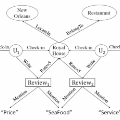Document-level Sentiment Analysis (DSA) is more challenging due to vague semantic links and complicate sentiment information. Recent works have been devoted to leveraging text summarization and have achieved promising results. However, these summarization-based methods did not take full advantage of the summary including ignoring the inherent interactions between the summary and document. As a result, they limited the representation to express major points in the document, which is highly indicative of the key sentiment. In this paper, we study how to effectively generate a discriminative representation with explicit subject patterns and sentiment contexts for DSA. A Hierarchical Interaction Networks (HIN) is proposed to explore bidirectional interactions between the summary and document at multiple granularities and learn subject-oriented document representations for sentiment classification. Furthermore, we design a Sentiment-based Rethinking mechanism (SR) by refining the HIN with sentiment label information to learn a more sentiment-aware document representation. We extensively evaluate our proposed models on three public datasets. The experimental results consistently demonstrate the effectiveness of our proposed models and show that HIN-SR outperforms various state-of-the-art methods.
翻译:由于语义联系模糊,情绪信息复杂,文件敏感度分析(DSA)更具挑战性,因为语义联系模糊,情绪信息复杂,最近的工作致力于利用文本总结,并取得了令人乐观的成果;然而,这些基于总结的方法并没有充分利用摘要,包括忽视摘要与文件之间的内在互动;结果,它们将代表性局限于文件的要点,这非常能说明关键情绪;在本文件中,我们研究如何有效地产生具有明确主题模式和感知背景的歧视性代表性;建议一个等级互动网络(HIN)探讨多颗颗颗粒的概要与文件之间的双向互动,并学习以主题为导向的文件表达方式来进行情绪分类;此外,我们设计基于感知的思考机制(SR),用情绪标签信息改进HIN,以学习更多感知的文件表述;我们广泛评价了我们提议的三种公共数据集模式的模式;实验结果不断显示我们提议的模型的效力,并显示HIN-SR超越了各种状态方法。



